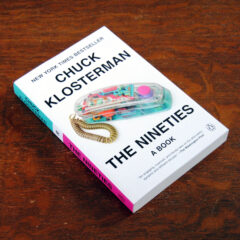
In The Nineties, Chuck Klosterman looks back at the last decade that actually felt like a decade. It’s hard to view this book as anything other than a transformation, but it’s also hard to ignore that reading this book puts you back there.
This book is a time capsule with the perverse insights that make you wonder about your own memory, the collective memory, and all with a sincerity, exuberance, and authenticity that feels proper.
If you’ve never read Chuck Klosterman’s work before, this might be as good an introduction as any. It’s poignant and intuitive, obvious and thought-provoking, illustrious and banal -much like the decade at the focus of this book.
“Now, the 1990s seem like a period when the world was starting to go crazy, but not so crazy that it was unmanageable or irreparable. It was the end of the twentieth century, but also the end to an age when we controlled technology more than technology controlled us. People played by the old rules, despite a growing recognition that those rules were flawed. It was a good time that happened long ago, although not nearly as long ago as it seems.”
What makes this book stand alone is that it tackles recent history without attempting to put it in a bubble. He references the here and now of the book’s creation and things that have happened since the Nineties ended, because drawing those lines is the right thing to do.
But mostly, this book is an exercise in philosophy. To those who didn’t experience the Nineties they would “make no sense at all. But the future can’t exist until the present is past.” I love this. The fact that the ideas of the past may seem ridiculous now, but that they seemed valid at the time, is obvious but often overlooked.

It’s not an understatement to say that the Nineties were the end of something. It’s not that it was the end of the millennium or the end of innocence, it’s that it was the end of the way things always had been.
Discussing Generation X, who were the forebears of this new world, Klosterman quotes Michael Harris from The End of Absence, “If we’re the last people in history to know life before the Internet, we are also the only ones who will ever speak, as it were, both languages. We are the only fluent translators of Before and After.
“The world, as always, was changing. But it seemed increasingly possible that it was changing faster than its inhabitants could understand, so they just had to pretend that they did.”
As possibly one of the youngest members of that generation, he’s right and Klosterman’s book is a great example of how true that is. I grew up in the 90s. They were my formative decade, and while Klosterman has a few years on me, we didn’t experience the decade that differently. Our memories, as a result, aren’t that different.

To say that I enjoyed this book would be an understatement. I’m a fan of both Klosterman and Coupland. When the first chapter turned into a small ongoing conversation between the two of them, I felt like I was in the room with them. The rest of the book mirrored my own experiences and discussions about the Nineties and the way we look back on them.
This book is delightful. If you are a fan of Chuck Klosterman, you can’t skip this one. If you are a fan of Douglas Coupland, this book is for you. If you were born before 1987 this book may actually be a form of “emotional reassurance” for you.
If you were born after 1988, this book might help you piece together how we got here. If you’re a Boomer or older, this book may help explain to you all the missing pieces from those kids who grew up with a failed corporate Woodstock and all those digital devices that changed music and the world at large.
Read the Secret File of technical information and quotes from The Nineties by Chuck Klosterman.